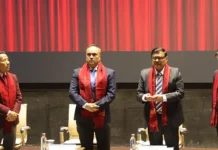[ Bengia Ajum ]
In the summer of 2009, I was sweating it out in the national capital Delhi, hopping from one end of the city to another, learning the nuances of journalism, working as a trainee reporter at The Hindu newspaper. It was in August 2009 that I got a call from my mother, who told me that there was an advertisement for a vacant post in The Arunachal Times. I was a young man wanting to learn and work in Delhi, but could not say no to the pressure of my mother.
She always wanted me to come back and work in the state. Very reluctantly, I applied for the post, and sent my biodata by email to the management of this daily. A few days later, I got a call from the editor of The Arunachal Times and I was told I had been selected. I went through mixed emotions. On one hand, my parents were happy to know that I was coming home, and I was happy for them. Personally, I wanted to stay back in Delhi and pursue my journalism career and therefore was a bit sad. I was asked to report to this daily on 5 October, 2009, and I did so. I am recalling all those moments because come 5 October, I will be completing 13 years in this daily.
I have the most amazing boss one can ever dream of in Dr Audrey Apang, who is my editor. She is the biggest support and one who always stands behind us. My senior colleague and one of the finest journalists of the state, Tongam Rina, is another person who has always backed me. The past 13 years working as a journalist in the state have been amazing. The best part of being in this profession is the opportunity one gets to travel across the state and be the voice of the voiceless. The more you travel, the more you fall in love with the people of the state.
When I joined the states’ media in 2009, there were barely a few journalists and media houses in the state. Today, there are eight daily newspapers and countless digital media channels. The number of journalists too has grown significantly. It is great to see this growth in the media sector, and it gives hope to a lot of people. But those choosing this profession need to understand that, unlike other professions, journalism is a very serious profession. This profession demands a certain amount of sacrifice, sincerity, and dedication. At a time when the national media are almost becoming the mouthpiece of the ruling BJP, it is heartening to see many journalists and media houses working independently here in Arunachal Pradesh. The press in the state still has the courage to ask uncomfortable questions of the ruling elites. The behaviour of people is also changing. When I had joined the media in 2009, people, including politicians, bureaucrats, and even ordinary citizens, were not receptive to being criticised. I vividly remember, once I wrote a story about backdoor appointments in certain departments after being provided with the required RTI documents by a pressure group.
As soon as the story broke, those who got illegal appointments started to call and threaten me. “Mera biwi bachcha ko tumhara ghar pohuncha dega, tum palo agar mera naukri jaane se,” threatened one caller. I had to literally switch off my phone for days to avoid them. Things are much better now. People have understood the role of the media and therefore there is better acceptance of criticism as well as praise.


